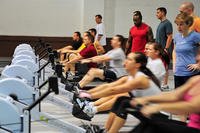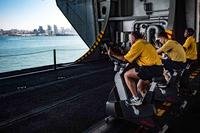Free weights or machines?
A hotly contested issue in the world of bodybuilding if ever there was one.
As the tough guys duke it out on this one, I prefer to take a practical approach. That is, the answer to this question depends largely on where you're at in your training and what you're hoping to achieve.
Now, typically, I'm a full-on, free-weight maniac. However, there are a couple of instances when using machines can make a lot of sense.
For complete beginners, weight machines are ideal. First, they're easy to use. There are diagrams on the side that explain how the machine works. It's virtually impossible to screw it up, which also reduces the risk of injury.
Similarly, machines are less intimidating for the first-time lifter. Fumbling around with barbells and plates when surrounded by the no-neck "big boys" isn't particularly appealing. (Not to mention the embarrassing sonic boom of the plates hitting the floor as you realized for the first time that you can't have 135 pounds on one end of the bar and take the other plates off at the same time. Hey, we've all done it.)
Eventually, however, you want to use free weights. Machines will teach you proper form and show you how to do different exercises. Once you've got the basics down, it's just a matter of applying those lessons to the free weights.
As we age, we may require more stability with our exercise choices, depending upon how well our body's structure is holding up. And due to the limited range of movement of machines, they can help avoid injury for the "over 40" crowd.
Now, I'm not applying for nursing homes just yet. But I can tell you that 10 years of humping a rucksack through deserts, forests, jungles and arctic wastelands in the military has wreaked a bit of havoc with my joints.
For those of us with less stable body connections, machines can offer a way to push more weight with less chance of injury.
Since machines follow a specific path of movement and offer more stability, those who are coming back from an injury (the word "rotator cuff" comes up a lot in emails I receive) will be better off using machines instead of jumping back into a free-weight routine targeting the injured muscle group.
Keep the weight light and prepare your ligaments and tendons for the free-weight barrage you're salivating over.
More from Anderson at:
Jeff Anderson is a 10-year veteran of the U.S. Army, a master instructor of close quarters combat self-defense and president of the International Society of Close Quarter Combatants. A full-time, self-defense author and instructor, Anderson has trained military, law enforcement and civilians in advanced close quarter combat tactics for "real-life" self-defense.
Want to Learn More About Military Life?
Whether you're thinking of joining the military, looking for fitness and basic training tips, or keeping up with military life and benefits, Military.com has you covered. Subscribe to Military.com to have military news, updates and resources delivered directly to your inbox.

















